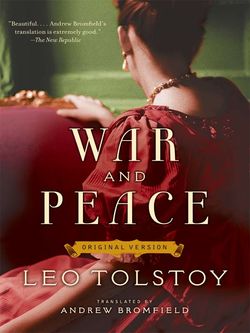Читать книгу War and Peace: Original Version - Лев Толстой, Leo Tolstoy, Liev N. Tolstói - Страница 35
XXV
ОглавлениеThe card tables had all been set up, parties sat down to play boston, and the count’s guests settled themselves throughout the two drawing rooms, the sitting room and the library. Marya Dmitrievna scolded Shinshin, with whom she was playing.
“You’re so good at criticising everybody else, but you couldn’t even guess that with the queen of hearts you should lead a heart.”
The count, fanning out his cards, struggled to abstain from his customary after-dinner sleep and laughed at everything. The young people, encouraged by the countess, gathered around the clavichord and harp. At everybody’s request Julie first played a little piece with variations on the harp and then, together with the other girls began asking Natasha and Nikolai, known for their musicality, to sing something. Natasha, to whom they appealed more than anyone else, neither agreed nor refused.
“Wait, I’ll try,” she said, moving to the other side of the clavichord and, trying out her voice, she quietly sang several pure full-throated notes that were surprisingly moving. Everyone fell silent as the sounds faded away in the lofty, high-ceilinged room.
“I can, I can do it,” she said, happily tossing back her curls, which were tumbling over her eyes.
Pierre, very red in the face after dinner, went over to her. He wanted to look at her from closer up and see how she would talk to him.
“And why might you not be able to?” he asked as simply as if they had known each other for a hundred years.
“There are some days when the voice just isn’t any good,” she said and moved over towards the clavichord.
“And today?”
“It’s excellent,” she said, addressing him with as much enthusiasm as if she were praising somebody else’s voice. Pierre, pleased to have seen how she spoke, went over to Boris, whom he liked almost as much today as Natasha.
“What a lovely child, that little black-haired girl,” he said. “Even though she isn’t good-looking.”
After the boredom of isolation in his father’s big house, Pierre found himself in that happy, young man’s state of loving everyone and seeing nothing but good in everyone. At dinner he had still unwittingly despised the Moscow public from the elevated height of St. Petersburg. But now he already felt that only here in Moscow did people know how to live and he even thought how good it would be to visit this house every day, and listen to this little black-haired girl sing and talk, and look at her.
“Nikolai,” said Natasha, going up to the clavichord, “what shall we sing?”
“Perhaps ‘The Spring’,” replied Nikolai. He was clearly beginning to find it impossible to put up with the importunate Julie, who thought he ought to be overjoyed at her attentions.
“Well come on, come on, Boris, come over here,” Natasha called. “And where’s Sonya?” She glanced around and, seeing that her friend was not in the room, ran to get her.
“The Spring”, as it was known at the Rostovs, was an old four-part song which they had been taught by their music teacher, Dimmler. This “Spring” was usually sung by Natasha, Sonya, Nikolai and Boris, who, although he did not have any special talent or voice, had a good ear and with his characteristic exactitude and imperturbability could learn a part and hold his own. While Natasha was gone, they started asking Nikolai to sing something. He refused in a manner that was almost uncivil and morose. Julie Akhrosimova, smiling, went up to him:
“Why so gloomy, all of a sudden?” she asked. “Though I do understand. For music, and for singing especially, you have to be in the mood. It’s the same for me. There are certain moments …”
Nikolai frowned and walked towards the clavichord. Before he sat down he noticed that Sonya was not in the room and he almost wanted to leave.
“Nikolai, don’t make me beg you, it’s absurd,” said the countess.
“I’m not trying to make you beg, maman,” Nikolai replied and he opened the clavichord, banging the lid with an abrupt movement, and sat down.
He thought for a moment and began a little song by Kavelin:
Why say that fateful word, “adieu”,
When you are parting from your love,
As if life has abandoned you,
And happiness is gone for ever?
Say rather, “till we meet again”,
Say, “till our joy returns anew”.
Dismiss time with this sweet refrain,
To your own love remaining true.
His voice was neither good nor bad, and he sang indolently, as though fulfilling a tedious obligation, but despite that, the entire room fell silent, the young ladies swayed their heads and sighed, and Pierre concealed his teeth behind a gentle, faint smile that looked especially funny on his fat, full-blooded face, remaining like that until the end of the song.
Julie closed her eyes and sighed so loudly that the entire room could hear her.
Nikolai sang with the sense of measure that he so badly lacked in life and which in art cannot be acquired by any study. He sang with a lightness and freedom which demonstrated that he was not labouring, but singing just as he spoke. Only when he began to sing did he express himself not like the child he seemed to be in life, but like a man in whom passions were already stirring.
